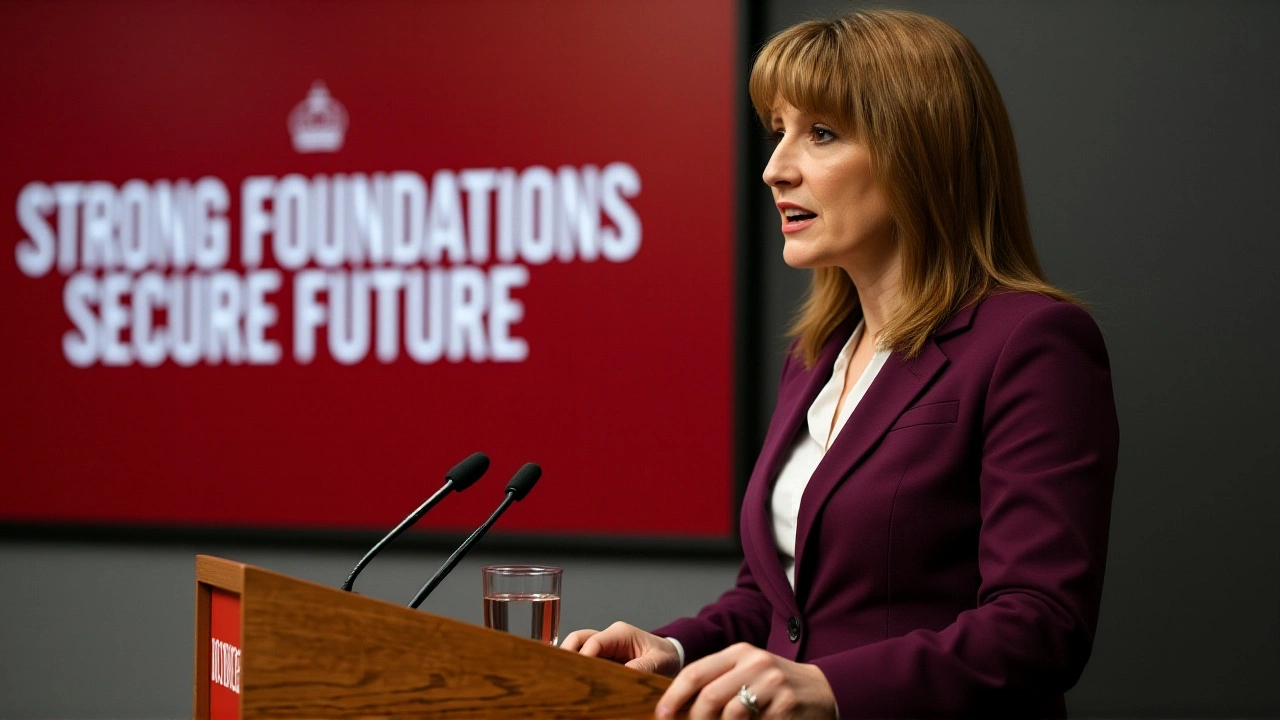
When Rachel Reeves stood up in the House of Commons on Wednesday, November 26, 2025, she didn’t just present a budget—she rewrote the rules of fairness in British taxation. Her Autumn Budget 2025 delivered a blunt message: the era of ignoring wealth concentration is over. With a mansion tax on homes worth over £2 million, a new electric vehicle mileage charge, and a £12.71 minimum wage, Reeves isn’t just balancing books—she’s recalibrating social contracts. The Office for Budget Responsibility (OBR) confirmed the measures will raise £3.1 billion over three years, but the real impact? It’s in the quiet relief of a single parent working two jobs, finally seeing a pay rise that outpaces inflation.
Why the Mansion Tax Isn’t Just About Rich Homes
The Autumn Budget 2025 introduced a progressive property tax that starts at £2,500 annually for homes valued between £2 million and £2.5 million, climbing to £7,500 for those worth £5 million or more. This isn’t a punitive measure—it’s a correction. For decades, property wealth in the UK has grown faster than wages, especially in London and the South East. A £3.2 million home in Wimbledon might sit empty for months, while a teacher in Manchester struggles to afford a deposit. The OBR estimates this single policy will generate £400 million annually, but its symbolic weight is heavier than its revenue. It’s the first time since 1997 that the UK has directly taxed wealth above a threshold, not just income.Electric Cars? Now You Pay Per Mile
Here’s the twist: electric vehicles, once celebrated as climate heroes, are now subject to a new mileage tax. Starting April 2026, EV owners will pay 12p per mile—roughly matching the fuel duty paid by petrol drivers. The OBR expects this to raise £1.4 billion, closing a loophole that’s cost the Treasury £1.8 billion since 2020 as EV sales surged past 1.2 million. Critics call it unfair, but the government argues it’s about equity. “If you’re driving 15,000 miles a year in a £70,000 Tesla, you’re not the person who needs a subsidy,” said one Treasury official off-record. The policy also phases out the zero-rate Vehicle Excise Duty for EVs by 2028, aligning them with conventional cars in terms of road funding.Minimum Wage Jump: £900 More for 2.4 Million Workers
The most human part of the budget came in the form of wage increases. The Rachel Reeves-backed national living wage for those aged 21 and over rose 4.1% to £12.71 per hour, effective April 2026. That’s an extra £900 a year for full-time workers—money that will go straight into groceries, school uniforms, or heating bills. For the 2.4 million people affected, it’s not a policy—it’s survival. Workers aged 18 to 20 will see an even steeper 8.5% bump, to £10.85. “Too many people are still struggling to make ends meet,” Reeves said on ITV News the day before the announcement. The Institute for Fiscal Studies (IFS) called it “the most significant wage uplift since 2016,” though they warned it could pressure small businesses already squeezed by energy and supply costs.
Scrapped Two-Child Cap: A Moral Shift
The decision to scrap the two-child benefit cap from April 2026—costing £2.3 billion—was perhaps the most emotionally charged move. Introduced in 2017, the cap denied additional support to families with more than two children, often pushing them into deeper poverty. The OBR confirmed the policy had failed to reduce birth rates but sharply increased child hardship. By removing it, the government acknowledges a truth long ignored: poverty isn’t a choice. Advocacy groups like Child Poverty Action Group celebrated the move, calling it “a long-overdue step toward dignity.” But critics warn it could fuel inflationary pressure. The truth? It’s a trade-off: higher public spending now, or higher societal costs later in healthcare, crime, and education.What’s Left Out—and Why It Matters
For all its ambition, the budget froze tax thresholds for another three years. That means as wages rise with inflation, more people will be dragged into higher tax bands—a phenomenon known as fiscal drag. The OBR estimates 1.1 million additional workers will pay the 40% rate by 2028. Meanwhile, the Personal Allowance remains frozen until April 2028, and dividend tax credits for non-UK residents were axed. These aren’t headline-grabbers, but they’re the quiet tax hikes that hit middle-income households hardest. The government says it’s “protecting public services,” but the IFS called it “a stealth tax on aspiration.”
The Bigger Picture: Growth, Inflation, and the Cost of Fairness
The UK economy is now projected to grow just 1.5% in 2025—down from the 2.1% forecast earlier this year. Inflation is expected to hold at 3.5%, higher than the OBR’s March prediction, driven by wage pressures and food costs. The government argues these policies are necessary to stabilize public finances after years of pandemic spending. But the real test comes in 2027, when the mansion tax and EV charges fully take effect. Will they reduce inequality—or just push wealth underground? Will higher wages spark a consumer boom, or force businesses to cut jobs? The answer will shape Britain’s economic identity for a generation.What’s Next?
The Finance Bill 2025-2026 will now pass through Parliament, with debates expected on the mansion tax’s valuation methods and the EV mileage rate. Local councils will receive new guidance on how to implement property revaluations. Meanwhile, the UK Treasury has published 25 detailed tax impact notes on gov.uk, covering everything from aggregates levy devolution to tobacco duties. All measures take effect from April 2026 unless noted. Watch for the first property valuations in Q2 2026—those will tell us who’s truly affected.Frequently Asked Questions
How does the mansion tax affect homeowners who aren’t rich?
The mansion tax only applies to homes valued over £2 million—roughly the top 0.5% of UK properties. Most homeowners, even in London, won’t be touched. The OBR estimates only 140,000 properties fall into this bracket. The tax is designed to target second homes, investment properties, and ultra-expensive residences, not families who’ve lived in their homes for decades. Valuations will be based on market value as of April 2026, with appeals allowed.
Why tax electric vehicles if they’re good for the environment?
The tax isn’t about punishing green tech—it’s about fairness. EVs have been exempt from fuel duty and vehicle tax, costing the Treasury £1.8 billion since 2020. As EV adoption hits 30% of new car sales, that gap threatens road funding. The 12p-per-mile charge mirrors petrol car costs and ensures all drivers contribute to infrastructure. The government still offers grants for EV purchases and charging infrastructure.
Will the minimum wage increase cause job losses?
The Institute for Fiscal Studies (IFS) models a potential 0.3% reduction in low-wage employment, mostly in hospitality and retail. But with inflation cooling and consumer spending rising from wage gains, many economists believe demand will offset job losses. The OBR notes that businesses with higher margins (like supermarkets) are better positioned to absorb costs than small cafes or cleaners.
What does freezing tax thresholds mean for my paycheck?
If you get a 3% raise in 2026 and inflation is 3.5%, you’ll technically earn more—but you’ll pay more tax because your income pushes into higher bands. This is called fiscal drag. The OBR says 1.1 million people will pay 40% tax by 2028 who didn’t before. It’s a hidden tax increase that doesn’t require new legislation, just inflation and frozen thresholds.
How will the government spend the £3.1 billion raised?
The £3.1 billion in new revenue will fund the £2.3 billion cost of scrapping the two-child benefit cap, plus investments in NHS waiting lists, school maintenance, and energy bill support. The OBR estimates £500 million will go to local councils for housing and social care, with the rest covering the EV tax gap and gambling revenue shortfalls. No new debt is being issued—this is a revenue-neutral reallocation.
Is this budget progressive or regressive overall?
By most measures, it’s progressive. The richest 1% will pay more via mansion tax, EV charges, and dividend rule changes. The poorest benefit from scrapping the two-child cap and wage hikes. But the frozen tax thresholds hit middle earners hardest—those earning £35,000 to £50,000. The IFS calls it “a mixed bag: fair in intent, uneven in impact.” The real test will be whether future budgets correct that imbalance.